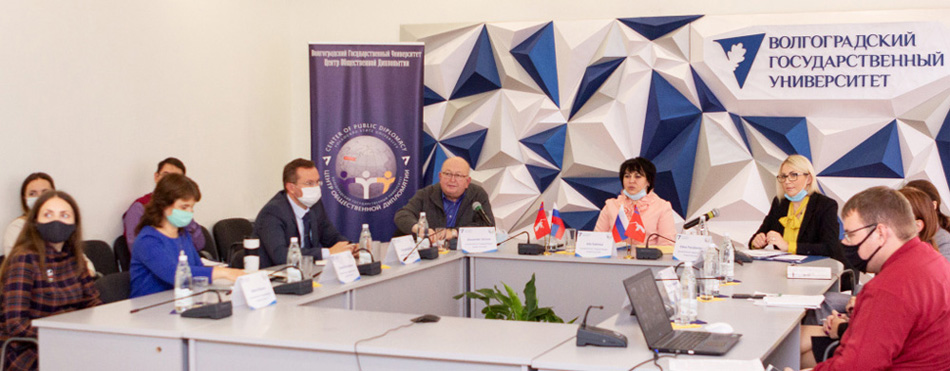I.P.O. Information Service
WORLD ORDER IN A TIME OF TRANSITION
President of I.P.O. addresses digital
International Forum of People's Diplomacy in Volgograd

* VIENNA, AUSTRIA *

* VOLGOGRAD, RUSSIA *
Panelists assembled at the Center of Public Diplomacy of Volgograd State University. Center: Ms. A. E. Kalinina, Rector of Volgograd State University, and Dr. Alexander Strizoe, Professor of Sociology, Volgograd State University, moderator.
Vienna (Austria) / Volgograd
(Russia), 2 November 2020
RE/20792c-is
Three decades after the end of the Cold War, the world is faced with the need for a major realignment of global powers. The unipolar order of the period immediately following the Cold War has proven unsustainable. The collapse of the bipolar order of the post-World War II era has triggered a process in which a multitude of states negotiate a new balance of power. The emerging multipolar constellation will be substantially different from that of 1945, around which the United Nations Organization was established.
In a speech at an international panel discussion, organized by Volgograd State University, on the question, "Is there a way from mutual mistrust to dialogue?", the President of the International Progress Organization, Dr. Hans Köchler, emphasized that the present phase of transition to a new balance of power will be a litmus test not only for the relevance of intergovernmental organizations such as the United Nations and its specialized agencies, but also for regional structures such as the European Union. Existing frameworks of cooperation will need to be adapted to the realities of the 21st century. Emerging global and regional powers, and their frameworks of co-operation such as BRICS, will need to be integrated into the global decision-making process.
In his address transmitted from the headquarters of the I.P.O. in Vienna, Dr. Köchler further stated that the Covid-19 pandemic has made obvious major structural weaknesses in the system of inter-governmental cooperation. The sovereignty of states not only implies the right of states to protect their citizens and to defend the national interest, but also the responsibility to respect the rights of other states. Under conditions of a global health crisis, every state has the duty to contain the further spread of the epidemic - in the mutual interest of all members of the international community. In view of the tragedy inflicted on millions of people all around the globe, it is time, Dr. Köchler concluded, to reconsider the doctrine of globalization and to search for a new and sustainable model of global development.
The digital discussion at the Center of Public Diplomacy was opened by the Rector of Volgograd State University, Ms. A. E. Kalinina. The session was moderated by Prof. Alexander Strizoe of the Department of Sociology and Social Technologies at Volgograd State University. Among the panelists taking part via video link were Prof. Constantinos Koliopoulos, Dept. of International Politics and Strategic Studies at Panteion University in Athens, Greece, Ms. Krasheninnikova Veronika Yurievna, President of the Institute of Foreign Policy Research Initiatives, Moscow, Russia, and Mr. Bill Boerum, Chairman Emeritus, "Sister Cities International," San Francisco, United States.
Following the meeting at Volgograd State University, the President of the I.P.O. headed a digital international panel discussion on "International Relations in Times of Change," organized by the Municipality of Volgograd in the framework of the annual "Dialogue on the Volga: Peace and Mutual Understanding in the XXI Century." In his introductory statement, Dr. Hans Köchler drew the attention of the participants to the risks of transition from a bipolar - via unipolar - to a new multipolar power constellation - where a struggling hegemon may be tempted to wage preventive war against an emerging rival. He also raised the question of nuclear disarmament in the face of re-emerging great power rivalries and characterized the policy of unilateral sanctions, and their extraterritorial enforcement, as major threat to peace at the global level. Dr. Ján Čarnogurský, former Prime Minister of Slovakia, speaking from Bratislava, emphasized the volatility of the unipolar order in the years after the end of global bipolarity. Mr. Anton Varfolomeyev, Head of the Study Center for New Challenges and Threats at the Diplomatic Academy of the Russian Foreign Ministry, highlighted, inter alia, the role of the nation-state in tackling the global health crisis triggered by Covid-19. Mr. Alexander Rahr, Academic Director of the German-Russian Forum, Berlin, emphasized the indispensability of the United Nations Security Council in resolving international conflicts and called for a more inclusive approach in matters of international security, highlighting the increasing role of countries such as India and Turkey.
The International Forum of People's Diplomacy concluded its deliberations with a digital roundtable on "Rehabilitation after COVID-19."
Enquiries: info@i-p-o.org, phone +43-1-5332877, fax +43-1-5332962, postal address: A-1010 Vienna, Kohlmarkt 4, Austria